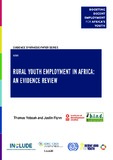| dc.contributor.author | Yeboah, Thomas | |
| dc.contributor.author | Flynn, Justin | |
| dc.date.accessioned | 2021-05-07T13:54:21Z | |
| dc.date.available | 2021-05-07T13:54:21Z | |
| dc.date.issued | 2021 | |
| dc.identifier.citation | Yeboah, T. and Flynn, J. (2021) Rural Youth Employment in Africa: An Evidence Review, Evidence Synthesis Paper 10/2021, Leiden: INCLUDE Knowledge Platform | en |
| dc.identifier.uri | https://opendocs.ids.ac.uk/opendocs/handle/20.500.12413/16588 | |
| dc.description.abstract | Most of the world’s poor today are found in rural Africa, and forecasts suggest that this concentration might become more pronounced if current trends continue. Despite increasing urbanisation, there are projections that around half of Africa’s new jobseekers will need to find employment in rural areas, at least until 2030 (Filmer and Fox, 2014; Mueller and Thurlow, 2019). Africa has a youth employment challenge, which is particularly acute in rural areas, as sustainable and decent employment opportunities for young people are very limited, and poverty rates are high (AfDB 2016; IFAD, 2011). In this regard, ensuring that Africa’s rural youth population find decent employment has become an important part of Africa’s and donors’ development and policy agendas. In this report, we seek to understand the nature of
rural youth employment in Africa and to evaluate the potential of the rural economy to provide decent employment for young people in Africa. Specifically, we seek to answer the following question: ‘What does the evidence tell us about rural youth employment in Africa, and specifically about how more decent employment opportunities can be generated for rural youth?’ Our paper focuses mainly on the role of agriculture as the basis for the generation of this employment. In order to answer our research question, we review the evidence (mainly academic articles and grey literature) around four main themes: the case for ‘agriculture as the engine of economic growth’ in rural Africa, outcomes of youth employment in agriculture, in particular in terms of decent jobs, youth perceptions and aspirations of these areas and sectors, and the effectiveness of government and other related interventions to promote decent youth employment in rural Africa.
In order to conduct the analysis, the paper takes two approaches: first, it evaluates the employment situation through the lens of the Landscapes of rural youth opportunity framework (Sumberg et al., 2019), and second, through the lens of structural transformation. The first framework speaks in part to the institutional context and social norms surrounding rural youth employment, and the second framework informs us about the stage of economic development of a country. We use these frameworks because it has been recognised that the promotion of effective policies for economic development depend on ‘what stage of the development process a country is in and what institutions and social norms are in place’ (Christiaensen et al., 2020: 8). | en |
| dc.language.iso | en | en |
| dc.publisher | INCLUDE Knowledge Platform | en |
| dc.relation.ispartofseries | Evidence Synthesis Paper;10 | |
| dc.rights.uri | http://creativecommons.org/licenses/by/4.0/ | en |
| dc.subject | Agriculture | en |
| dc.subject | Children and Youth | en |
| dc.subject | Rural Development | en |
| dc.title | Rural Youth Employment in Africa: An Evidence Review | en |
| dc.type | Series paper (non-IDS) | en |
| dc.rights.holder | © INCLUDE Knowledge Platform | en |
| dc.identifier.externaluri | https://includeplatform.net/wp-content/uploads/2021/05/Rural-youth-employment-in-Africa-evidence-review.pdf | en |
| dc.identifier.team | Rural Futures | en |
| rioxxterms.funder | Default funder | en |
| rioxxterms.identifier.project | Default project | en |
| rioxxterms.version | AM | en |
| rioxxterms.funder.project | 9ce4e4dc-26e9-4d78-96e9-15e4dcac0642 | en |


